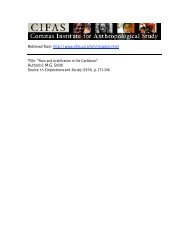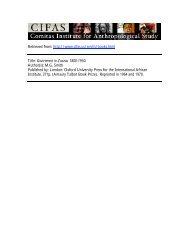Create successful ePaper yourself
Turn your PDF publications into a flip-book with our unique Google optimized e-Paper software.
<strong>Kano</strong> Chron£cle 47<br />
Following the Askia we know that Kana, having formerly been subject<br />
to Borno,86 fell under the domination of Kebbi, which under Kanta first<br />
threw off Songhai's yoke in 1516 A.D. and then rapidly established its<br />
dominion over western Hausaland, namely Gobir, Katsina, Yauri, Zamfara,<br />
Zazzau and <strong>Kano</strong>. 8 7 Nowhere does the Chron£cle mention this, though the<br />
extraordinary singing which Muhammadu Kisoke launched on the walls of<br />
<strong>Kano</strong> folloVving the- wlthdrawal of the king of Borno celebrates <strong>Kano</strong>'s<br />
independence from them both. 88 Neither .does it record any famine from<br />
Barbushe's day to Alwali's (1781-1807), who is the rirstruler reported to<br />
have experienced famine. Nor does it mention the plague (waba) that swept<br />
<strong>Kano</strong> for four years on the death of Kisoke (1565 A.D), and took his successors<br />
Yakubu and Dauda Abasama in less than a year. 8 9<br />
However, parallel omissions also occur in the Chron£cle's account of 18th<br />
century <strong>Kano</strong>. For example, was are told there that in Kumbari's time<br />
(1731-1743 A.D.) the 'Mai Ali' of Borno came to <strong>Kano</strong> to war. "He encamped<br />
at Faggi (Fage) for three nights without a battle being fought, since<br />
Shehu Ahiru ~d Shehu Bunduu prevented it. He returned to Borno.,,9 0 We<br />
are not told that <strong>Kano</strong> then lost its independence and became for a second<br />
time a vassal state of Barno, and remained thus until the Fula.Tli jihad. 9 1<br />
Thus at least the Chron£cle's omissions are not restricted to any period. It<br />
says far less about Baba Zaki (1768 1776) than Mallam Adamu does, and gives<br />
an extraordinarily terse account of the Fulani jihad at Kana. "In Alwali's<br />
time the Fulani conquered the seven Hausa states on the plea of reviving the<br />
Islamic religion. The Fulani attacked Alwali and drove him from <strong>Kano</strong>,<br />
whence he fled to Zaria.,,9 2 No briefer history of the jihad exists.<br />
As for later errors and omissions, to substantiate my interpretation,<br />
Muhammadu Bello's extension t,o the Chron£cle says that Al""",ali's sucessor,<br />
the first Fulani Emir Suleiman, went to ask the Shehu Usman dan Fodio's<br />
permission to o,ccupy the Hausa palace. 9 3 Palmer's text corrects this in a<br />
footnote - "He did not go to Sokoto but sent a message.,,94 As for<br />
omissions, Bello's extension totally omits the major attack on <strong>Kano</strong> ill 1826<br />
by the Shehu El Kanemi of Borno which threw the caliphate into great<br />
fear. 95 It omits any mention of the treachery of the Sarkin Filani Dambarta<br />
Dan Tunku and of Alwali's Ciroma Dan Nama, which ensured his defeat at<br />
the final battle of Dan Yayya. 9 6<br />
At the other extreme, the <strong>Chronicle</strong> illustrates the Muslim identity and<br />
bias of its authors. At its very beginning we are told that "Barbushe never<br />
descended from Dalla except on the two days of Idi when he would normally<br />
sacrifice either black dogs, fowls or he-goats at popular request.,,9 7<br />
In effect the <strong>Chronicle</strong> reinterprets the history of <strong>Kano</strong> in Muslim terms to<br />
conform with Islamic models of heathenism and reform in religion and<br />
government. Prematurely from Yaji's day and more securely from Muham-





